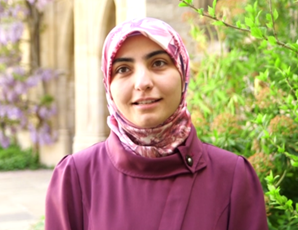
Heba Saliem
Dr Heba Saliem completed her PhD at The Institute of Cancer Research in 2014. Now at the University of Oxford, she was awarded a Sir Henry Wellcome Postdoctoral Fellowship to develop new computational methods to interpret data from large-scale imaging studies in 2017.
Heba’s PhD involved developing new analytical methods to facilitate discovery from large biological imaging datasets. Her results uncovered new links between cell shape and breast cancer progression and identified cellular signalling networks that may play a role in tumour invasiveness.
“My greatest achievement was developing a new visualisation technique that facilitates the interpretation of high dimensional data by generating pictorial representations based on hundreds to thousands of measurements,” she says. “It was published in Nature Communications and won best scientific poster award at an EMBO conference.”
After finishing her PhD, Heba took on a postdoctoral position at the Institute of Biomedical Engineering at the University of Oxford. In 2017, she was awarded a prestigious Sir Henry Wellcome Postdoctoral Fellowship – giving her the opportunity to develop her own independent research.
As part of this, she is planning to combine techniques from leading laboratories in computer vision, bioinformatics and systems biology based in the UK and Europe.
“My ambition is to establish an interdisciplinary research group leading a team of people on solving problems in image-based systems biology,” she says.
In 2018, she has been elected as a Junior Research Fellow at Corpus Christi College in Oxford which will allow her to further engage in the academic activities at the college.
Reflecting on how her time at the ICR continues to influence her career, she says: “My PhD supervisor Dr Chris Bakal is my main inspiration and his advice regarding various aspects of a career in research remains with me.”
She also remembers the outreach opportunities she took part in at the ICR to help inspire young people to study maths and sciences, including attending a science festival and volunteering as a STEM ambassador.
Her advice to prospective students about doing a PhD at the ICR is: “Be proactive and don’t hesitate to seek advice from more senior people – they can provide valuable insights and help you see the problem from a different angle.”